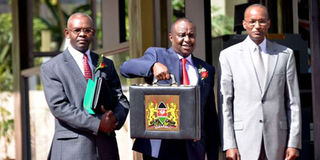Breaking News: At least 10 feared to have drowned in Makueni river
CS Rotich wants to spend Sh14.7bn by the end of the month

From left: National Treasury Principal Secretary Kamau Thuge, National Treasury Cabinet Secretary Henry Rotich and Central Bank of Kenya Governor Patrick Njoroge at Treasury Building before leave for Parliament Buildings to present the budget for financial year 2016-17 in Nairobi on June 8, 2016. PHOTO | SALATON NJAU | NATION MEDIA GROUP
What you need to know:
- Details of the request by the Treasury, which was submitted to the National Assembly on Tuesday afternoon, will first be scrutinised by the Budget and Appropriations Committee.
- But questions are bound to arise, given that it is barely a month since the first Supplementary Budget was passed by the National Assembly. That mini-Budget was for Sh26 billion.
With barely seven days to the end of the financial year, the National Treasury has asked MPs to approve the expenditure of Sh14.7 billion via the second Supplementary Budget this year.
Details of the request by the National Treasury, which was submitted to the National Assembly on Tuesday afternoon, will first be scrutinised by the Budget and Appropriations Committee.
But questions are bound to arise, given that it is barely a month since the first Supplementary Budget was passed by the National Assembly. That mini-Budget was for Sh26 billion.
The National Treasury has already presented the budget for the coming financial year, whose approval has been put on hold after MPs protested the filing of a case challenging the legality of the new National Government Constituencies Development Fund Act.
National Treasury Cabinet Secretary Henry Rotich has already presented the budget statement and the Finance Bill through which the new tax measures ought to be implemented.
Supplementary budgets are used to get authorisation for money that has been spent without MPs’ approval and to adjust areas where the National Treasury feels there is need for reductions, increases or reallocations to cater for unforeseen expenses.
The National Treasury usually does not state how much of the mini-Budget has been spent and the money is usually released as soon as Parliament approves the expenditure.
In the scandal at the National Youth Service, the Auditor-General revealed that there was a plan to steal Sh3.5 billion allocated to the service in the Supplementary Budget for 2014/2015. That money had not been properly requisitioned, he said, and was in excess of the agency’s requirements.
In the details submitted to the National Assembly, the allocation to recurrent expenditure has been increased by Sh7.5 billion and that to development expenditure by Sh7.2 billion.
The biggest beneficiaries are the National Treasury, whose budget for recurrent expenditure has been increased by Sh7 billion, Interior ministry (Sh1 billion), the presidency (Sh447.8 million), National Intelligence Service (Sh350 million), Health ministry (Sh265.8 million), Agriculture ministry (Sh170.8 million) and the National Land Commission (Sh18.6 million). The bulk of the National Treasury’s allocation will go to the Kenya Revenue Authority for subsidies.
The Teachers Service Commission was the biggest loser under the recurrent expenditure allocations and had Sh1.5 billion, its budget for wages for temporary employees, taken away. Also in this category were the Environment ministry, whose Sh344.7 million has also been taken away.
In the books submitted to Parliament, the National Treasury said money from the Global Fund had reduced from the Sh3.7 billion expected to Sh2.7 billion. Grants from international organisations had also reduced to Sh2.8 billion from the Sh3.8 billion already planned for.





